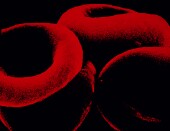Higher total WBC, neutrophil counts independently predict stroke in older Japanese-American men
WEDNESDAY, March 18, 2015 (HealthDay News) — Higher total white blood cell (WBC) and neutrophil counts are independent predictors of stroke in older Japanese-American men, according to a study published online March 4 in the Journal of the American Geriatrics Society.
Ji Young Huh, M.D., from the University of Hawaii in Honolulu, and colleagues examined the correlation between total and differential WBC count and incident stroke in a prospective population-based study. Data were included for 3,342 Japanese-American men, aged 71 to 93 years, who were free from stroke and had baseline WBC counts measured in 1991 to 1993. Participants were followed for eight years.
The researchers found that with increasing WBC quartile, the age-adjusted incident stroke rates increased (quartile 1 [Q1], 7.68; Q2, 9.04; Q3, 9.26; Q4, 14.10 per 1,000 person-years of follow-up; P = 0.001). Using the lowest quartile as a reference group, the hazard ratios were 1.62 in the highest quartile of total WBC and 2.19 in the highest quartile of neutrophil counts, after full adjustment, including age, cardiovascular risk factors, fibrinogen, prevalent coronary heart disease, cancer, chronic obstructive pulmonary disease, and nonsteroidal anti-inflammatory drug use. There were also significant correlations seen for thromboembolic, but not hemorrhagic, strokes. Lymphocyte or monocyte counts were not associated with incident stroke or subtypes.
“In elderly Japanese-American men, higher total WBC and neutrophil counts were independent predictors of overall stroke, as well as thromboembolic stroke,” the authors write.
Copyright © 2015 HealthDay. All rights reserved.








